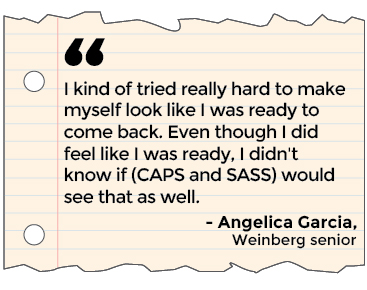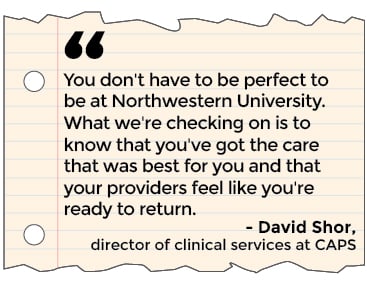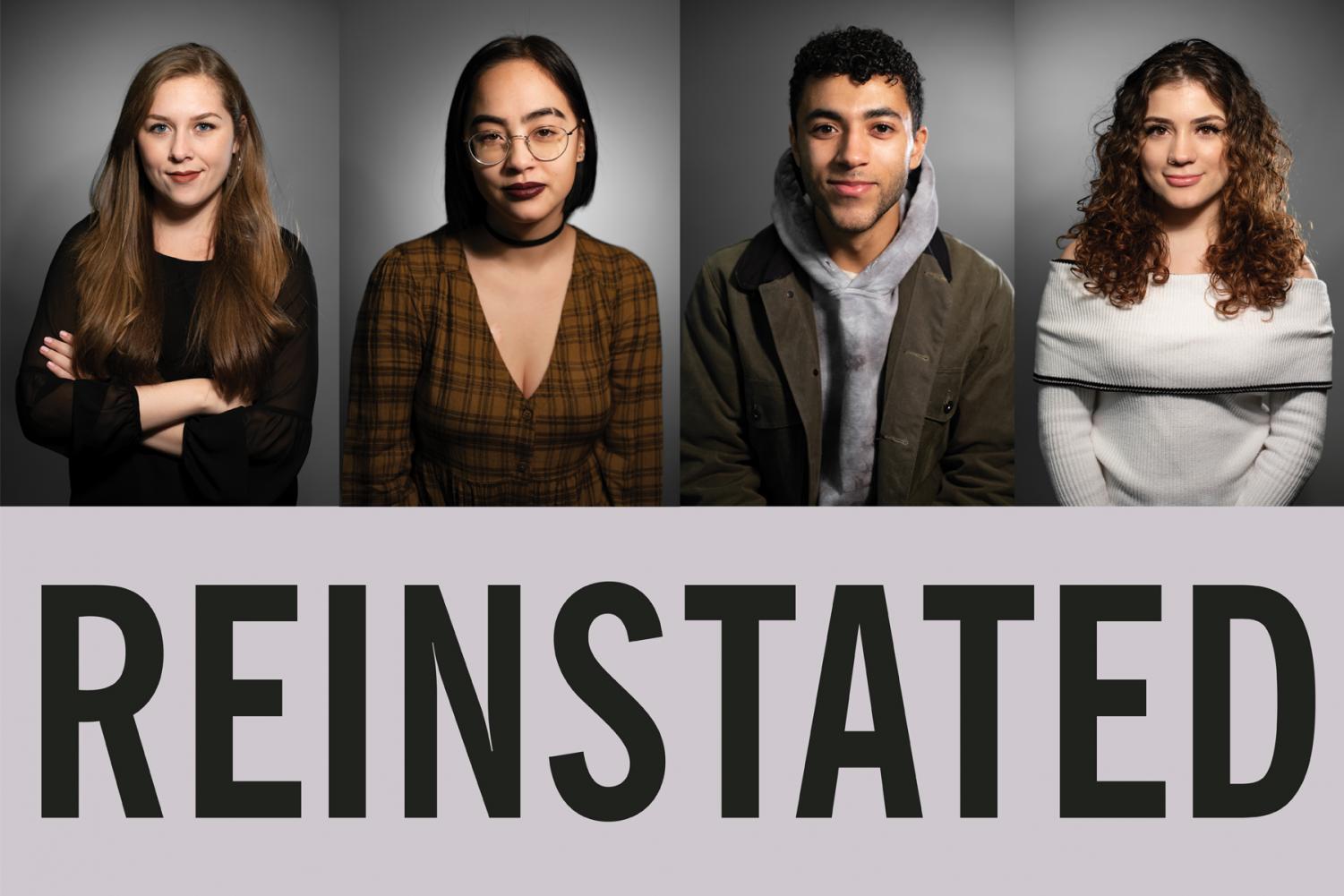In Focus: Students grapple with bureaucracy, lack of clarity after returning from medical leave
November 25, 2019
While on medical leave last year, Medill senior Drake Wilson received a letter from Northwestern reassuring him that he was “still a part of the Wildcat community” even if he wasn’t physically on campus. But following a frustrating and time-consuming process to return to the University after three quarters away, he said the letter’s message now strikes him as ironic.
Undergraduate students who choose to return from medical leave said they have encountered a wide range of logistical problems that made the reinstatement process daunting or even detrimental to their mental health and transition back to the University.
Students can apply for a medical leave of absence to focus on treatment for physical or mental health conditions off campus. About 160 students take medical leave each year, said Mona Dugo, department head of the University’s Student Assistance and Support Services, or SASS.
As students grapple with the stigma, trauma and isolation of living with physical or mental illnesses, they not only have to focus on their own recovery but also overcome institutional barriers in the process of rejoining the Northwestern community. Students who have returned from medical leave said they ran into complications with various aspects of the reinstatement process, including financial aid, course registration and inadequate guidance from the University.
“Being reinstated, it just felt like there was not a full understanding of what that time looks like for a student,” Wilson said. “There just seemed to be barriers that made it more difficult than it needed to be.”
Leaving — and stepping back in
The medical leave process is voluntary, though friends, family and medical professionals often provide support and guidance.
Students request to take medical leave through an online portal. The request goes to the Dean of Students Office, along with the director of Counseling and Psychological Services or the director of Health Services, depending on whether the leave is for mental or physical health reasons. Students receive an evaluation and a referral to SASS in the Dean of Students Office.
During an initial meeting, a SASS staffer and the student discuss logistics, including finalizing insurance treatment coverage and moving out of on-campus housing. The student receives a clean transcript and tuition refund for the quarter during which they request leave.
Dugo, the SASS department head and senior associate dean of students, said that once students are unenrolled, they must vacate on-campus housing. The entire medical leave process generally takes about a week, she said.
Students on leave for physical health reasons have different processes for reinstatement depending on their conditions. The director of Health Services declined to comment.

When they feel they’re “ready to come back,” students on medical leave for mental health reasons can submit a request for reinstatement and start the process to return, Dugo said.
David Shor, the director of clinical services at CAPS, said his office looks at information from providers and professionals whom students worked with while on leave to ensure it matches up with their treatment recommendations.
Students must also reactivate their CAESAR account and NetID, meet with CAPS and receive approval from the Dean of Students Office before they can come back to Northwestern. At the end of the day, the dean’s office makes the “final decision” about re-entry, Shor said.
“Stepping back in can also feel (like) there’s a lot of bureaucracy,” Dugo said. “So that is our job — to meet with students and help them make the decision about the reinstatement, but then also help them with all the steps.”
Roadblocks to returning
To maintain a sense of routine and ease the transition back to Evanston, Wilson said NU encouraged him to take classes at a university in Seattle, near his home, or get a job.
However, if students opt to take classes during leave, they do not count for credit, because the University believes students should focus on their mental health, not academics, Dugo said.
“If we don’t have the rule about it, what is absolutely going to happen is we’re going to have students taking medical leave trying to enroll in a lot of classes at other institutions and then transfer them in, which is going to defeat the purpose of the medical leave policy,” Dugo said.
Though he was aware of the University’s policy, Wilson wanted to take for-credit classes while on leave to help him transition back to the University after being in treatment and out of school for six months.
While this strategy might have worked for Wilson, Dugo said allowing classes to count for credit might encourage other students on leave to do so, which could be detrimental to their mental health.
Weinberg senior Angelica Garcia said it wasn’t clear how financial aid would be distributed during her leave and whether she would have enough to last until graduation. She took medical leave from February to September 2017 to deal with a recent concussion and address ongoing mental health problems.
Garcia said the uncertainty surrounding her financial aid package and her biology major requirements worried her throughout the reinstatement process. She said she wishes the University had helped her more with the logistics of returning to Northwestern.
Weinberg senior Emma Latz, who receives an annual National Merit Scholarship, took medical leave in 2019 to address her mental health. The Office of Undergraduate Financial Aid was supposed to refund the money to the National Merit Scholarship Corporation, she said.
Latz said the organization told her she wouldn’t continue to receive scholarship money unless the University refunded her tuition for the quarters she was on leave. However, she said, that didn’t happen until May — about five months after she had left.
Students who returned from medical leave for mental health reasons felt they needed to prove they were “cured” to be reinstated. Otherwise, the University would see them as a “liability,” said Wilson, who went on leave because his family urged him to.
Garcia said she wanted to seem “perfect” during her check-in, even though she had completed her treatment and received a reference letter from her therapist.
“I kind of tried really hard to make myself look like I was ready to come back,” Garcia said. “Even though I did feel like I was ready, I didn’t know if (CAPS and SASS) would see that as well.”
Latz said she was warned by a friend who had gone on medical leave before her to act like she was “completely happy” and didn’t struggle with mental illness anymore.
Shor said neither SASS nor CAPS intends to make students feel the need to act perfect, though he understands why students would feel that pressure.
“You don’t have to be perfect to be at Northwestern University,” Shor said. “What we’re checking on is to know that you’ve got the care that was best for you and that your providers feel like you’re ready to return.”
Students also said they didn’t think there was a clear distinction between the roles of CAPS and SASS members during reinstatement. Latz said she wasn’t sure how the two offices communicated because it seemed to her like CAPS had “different information” about her reinstatement process than SASS did.

Wilson originally thought he would only have to talk to CAPS medical professionals about the mental health-related reasons for his leave, and he didn’t understand why SASS needed to be involved in that part of the process, too.
Students sign a release of information before they work with SASS, so details about their mental health are available to SASS members.
Shor said CAPS and SASS work together to ensure that students transition smoothly back into the University, and he felt SASS members were only “express(ing) care” when they asked students to detail their mental health experiences.
But Wilson said having complex conversations about his mental well-being with someone who is not a trained medical professional seemed misguided.
“When I’m talking to an assistant dean, and they’re asking me these questions about my mental health, it just feels unnecessary,” Wilson said.
An “overall lack of guidance”
Latz said she was struck by the “overall lack of guidance” from the University during her reinstatement process and its consequences on her degree progress.
She started college intending to double major in biology and global health. But after returning from medical leave, Latz had to change her global health major to a minor because she wouldn’t be able to complete the requirements to graduate on time.
Students must study abroad on a public health-related program for the global health major and minor. Latz decided to study abroad in summer 2019, as soon as she got back from leave.
She had applied to the Northwestern program in Serbia and Bosnia-Herzegovina and been accepted while on medical leave. She discussed studying abroad with her outside providers and mentioned it to CAPS during her reinstatement interview. Everyone seemed on board, she said.
But as she began to plan her finances for the upcoming quarter, the dean’s office told her students could not study abroad immediately after returning from a medical leave. This information is also available on the University’s Global Learning Office’s website, but Latz was not told about this policy until after she had been accepted.
“The University does not have its s–t together,” Latz said. “The fact that I found out so late that this wasn’t an option for me was so insanely frustrating. … There’s just such a lack of information, a lack of clarity. I think that has been an issue the entire time I’ve been trying to get help from the University.”
Because Latz is enrolled in the University’s Accelerated Public Health Program, she will not be able to study abroad a different quarter, so Weinberg exempted her from the study abroad requirement. She will do a Chicago Field Studies internship during Winter Quarter instead.
“Studying abroad would have been a lot more learning about global health, which is something I’m really passionate about,” Latz said. “It was really disappointing to stay on campus, and because they told me so late it was too late to secure an internship (for the summer).”
Dugo said the University implemented the policy to ensure reinstated students have a successful quarter in Evanston before going abroad. But students can log into the Study Abroad Application system without using their NetID, so even if it’s been deactivated, they can still apply to a program.

In Wilson’s case, he said he couldn’t sign up for required journalism classes during his registration periods because his NetID was reactivated only after his window had passed and the classes had filled up.
“Things like that, just being up in the air, were really difficult to navigate,” Wilson said.
Dugo said she encourages students to start the reinstatement process early to avoid this problem.
Garcia also ran into unexpected complications when planning for classes after her reinstatement. She felt like she was on her own in putting together her schedule, especially because of logistical issues out of her control.
Biology majors must take a sequence of courses, including chemistry, biology and physiology. Some of these classes are only offered certain quarters and have prerequisites.
Garcia had not completed required chemistry courses during Winter and Spring Quarters of her freshman year because she was on leave.
She managed to enroll in an accelerated two-quarter general chemistry sequence, but said she had to figure out her class schedule mostly on her own.
She took her first biology sequence class a year later than intended because it was only offered in the spring, which she had missed while on leave.
Mary Finn, Weinberg’s associate dean for undergraduate academic affairs, said there is nothing administrators can do if a student misses a class in the sequence that’s only offered certain quarters. Weinberg does not reach out to students on medical leave because time off is intended for students to “get better,” Finn said.
“If they contact us, it’s not radio silence,” she said, “but it’s not part of the protocol to reach out.”
After students return from medical leave, it’s university policy to check in on them. Students are supposed to schedule a follow-up appointment with SASS around the third or fourth week of the quarter they return, Dugo said.
This is around the time students finish their first round of midterms, and the best time to see if a student is still “vulnerable,” she said. It is a mandatory process.
However, Communication senior Ashley Vensor, who started her medical leave in Spring 2017 and returned a year later, never completed her check-in appointment. She accidentally scheduled her appointment for Memorial Day, and no one was in the office. She said SASS never followed up with her about her mental well-being.
Dugo said Vensor’s situation was a “one-off” that “slipped through the cracks.”
But even beyond that first follow-up appointment, Vensor said the University needs to do more to check in with students who are returning from leave because adjusting back to school is “more difficult” than people think.
“Everything here seems to be reaction-based instead of proactive,” Vensor said. “Northwestern just didn’t do anything to help. (They were) just like, ‘Here, throw you to the wolves.’”
A lack of “bandwidth”
When he entered the SASS office for his reinstatement interview, Wilson said he was struck by how stressed staff members seemed. He felt like everyone in the office cared about his well-being, but didn’t have enough time to focus on him.
Dugo said the SASS office is “underwater,” but she hopes to address this problem by increasing staff size and implementing other changes to improve the student experience.
The office has four staff members who process all medical leave and reinstatement requests. SASS worked with 805 students total over the last academic year, Dugo said. Of those, about 160 were students requesting medical leave, and 130 were students requesting reinstatement, she said.
Dugo said the number of students taking leave has doubled since she joined the dean’s office in 2012, but SASS hasn’t grown at the same pace — they don’t have enough “bandwidth” to keep track of everything involving students on leave.
Although Dugo said there are no formal plans to increase support, the University is undergoing a “strategic planning process” to figure out how to streamline students’ return to the University.
Students emphasized that they were frustrated with the overall reinstatement process and not with individual people. Wilson said he hopes there will be changes, because he wants the process to be better for other people than it was for him.
“It just catches you in the most vulnerable time, and then you’re stuck with the situation for a really long time,” Wilson said. “I don’t think my parents would have recommended me taking a leave had they known it would be (so) difficult to get reinstated.”
He hopes the students who come after him won’t have to think twice.
Email: neyathanikachalam2022@u.northwestern.edu
Twitter: @neyachalam

